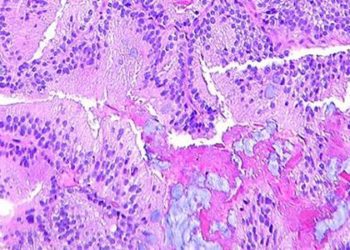Pembrolizumab improves median survival amongst those with recurrent urothelial carcinoma
1. Patients with recurrent urothelial carcinoma experienced significantly longer median survival times when treated with pembrolizumab compared with chemotherapy agents.
2. Fewer treatment-related adverse events were observed by the pembrolizumab group compared to the chemotherapy group.
Evidence Rating: 1 (Excellent)
Study Rundown: Metastatic urothelial carcinoma is a difficult condition to treat. First-line treatment consists of platinum-based chemotherapy regimens, though there is little consensus regarding second-line treatment. Immunotherapy consisting of antibodies against the programmed death 1 (PD-1) receptor has shown encouraging results in other metastatic conditions. This study aimed to evaluate the effect of pembrolizumab, an antibody against PD-1, compared to other second-line therapies for metastatic urothelial carcinoma recurring after platinum-based chemotherapy.
An international randomized phase 3 trial involved patients with urothelial carcinoma, which progressed after initial chemotherapy. Patients were randomized to receive either pembrolizumab or one of 3 chemotherapy regimens (paclitaxel, docetaxel, or vinflunine). Patients were treated and followed to assess survival, treatment response, and adverse effects. Those treated with pembrolizumab experienced significantly longer overall survival compared to those treated with chemotherapy, regardless of tumor PD-1 expression. Tumor response based on imaging was significantly better for those in the pembrolizumab group. There were less overall and severe adverse events due to treatment in the pembrolizumab group.
Click to read the study, published today in NEJM
Relevant Reading: Predictive correlates of response to the anti-PD-L1 antibody MPDL3280A in cancer patients
In-Depth [randomized controlled trial]: The study enrolled 542 patients (270 pembrolizumab, 272 chemotherapy) from 120 international sites between 2014 and 2015. Patients with advanced urothelial carcinoma that progressed following platinum-based chemotherapy were included in the study, while those who had previously received anti-PD-1 immunotherapy were excluded. Chemotherapy agents utilized included docetaxel, paclitaxel, and vinflunine. All treatment regimens were administered at 3 week intervals. Progression of tumor burden was evaluated by regular imaging, and adverse events were recorded. PD-L1 expression in tumors was evaluated so treatment response could be determined for those with high (>10% of tumor cells) or low PD-L1 expression. Study endpoints included overall survival, tumor response, and treatment safety.
The median duration of follow-up was 14.1 months. Overall survival was significantly longer in the pembrolizumab group compared to the chemotherapy group (HR 0.73; 95%CI 0.59-0.91; p = 0.002). For patients with high PD-L1 expression, pembrolizumab was associated with longer overall survival (HR 0.57; 95%CI 0.37-0.88; p = 0.005). The between-group analysis did not show any significant difference when it came to progression-free survival (HR for death or disease progression 0.98; 95%CI 0.81 to 1.19; p = 0.42). Treatment response observed on imaging was significantly higher for the pembrolizumab group (21.1% vs. 11.4%; p = 0.001). Adverse outcomes related to treatment were observed in 60.9% of pembrolizumab patients and 90.2% of those treated with chemotherapy. Regarding high severity adverse events, 15.0% and 49.4% were observed in pembrolizumab and chemotherapy groups, respectively.
Image: PD
©2017 2 Minute Medicine, Inc. All rights reserved. No works may be reproduced without expressed written consent from 2 Minute Medicine, Inc. Inquire about licensing here. No article should be construed as medical advice and is not intended as such by the authors or by 2 Minute Medicine, Inc.









